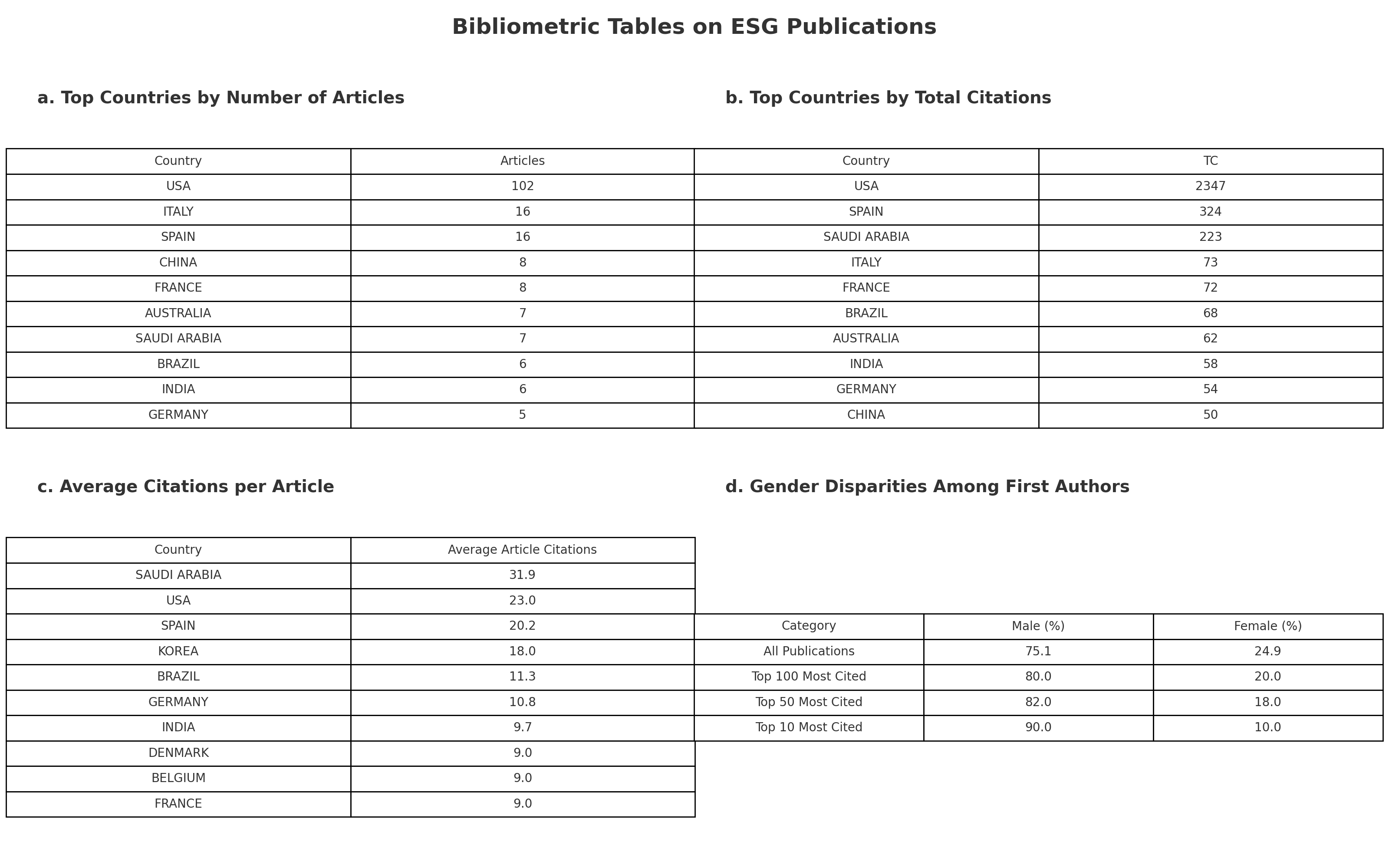Sunday Poster Session
Category: Interventional Endoscopy
P1386 - Underrepresentation Unveiled: A Global Analysis of Gender Disparities in Endoscopic Sleeve Gastroplasty (ESG) Research
Sunday, October 26, 2025
3:30 PM - 7:00 PM PDT
Location: Exhibit Hall

Renan Prado, MD
Cleveland Clinic Foundation
Cleveland, OH
Presenting Author(s)
Renan Prado, MD1, Roma Patel, MD2, Arjun Chatterjee, MD2, Leandro Sierra, MD3, Michael Cymbal, DO1, Akash Khurana, MD2
1Cleveland Clinic Foundation, Cleveland, OH; 2Gastroenterology and Hepatology, Cleveland Clinic, Cleveland, OH; 3Department of Internal Medicine, Cleveland Clinic, Cleveland, OH
Introduction: Recent studies have explored disparities in healthcare outcomes. However, few have addressed disparities in the publication of bariatric procedures. This gap may reflect broader global inequalities in access to innovative treatments. Specifically, the publication of Endoscopic Sleeve Gastroplasty (ESG) has not been thoroughly examined in terms of regional and gender publication factors. This study aims to explore the disparities in global publication of ESG.
Methods: Relevant publications with "Endoscopic Sleeve Gastroplasty" in the title were retrieved from the Web of Science Core Collection database. Bibliometric evaluation was performed using the R package Bibliometrics. Studies published between January 2013 and February 2025 were included. The only publication type excluded from the analysis was Meeting Abstracts.
Results: A total of 217 publications on ESG were identified, with an annual growth rate of 20.1%, reflecting increasing interest in the field. These studies were published in 66 journals and cited 2,180 references. A total of 1,059 authors contributed, with an average of 7.65 co-authors per document, highlighting strong collaboration. The average document age was 3.6 years, indicating a relatively recent body of literature. Each study received an average of 15.88 citations. The most common journals were Obesity Surgery, Gastrointestinal Endoscopy, and Endoscopy. Publications originated from 27 countries, with the USA leading (102; 47.0%), while the total publications from developing countries was 34 (15.7%). Gender was identified in 209 of 217 publications, with 75.1% male and 24.9% female first authors. Among the top 50 most cited papers, 82% were male-led.
Discussion: This bibliometric analysis reveals pronounced disparities in the global dissemination of ESG research. Scientific output is disproportionately concentrated in high-income countries, with limited contributions from developing regions, potentially reflecting systemic barriers to the adoption and evaluation of ESG in lower-resource settings. Furthermore, a marked gender imbalance exists, with male authors leading the vast majority of high-impact publications. These findings underscore the need for more equitable research investment, collaboration, and capacity-building initiatives to ensure broader access, representation, and innovation in the field of bariatric endoscopy. Addressing these disparities is essential to achieving truly global advancement in ESG research and clinical implementation.

Figure: Tables for disparities in ESG publications

Figure: Images for disparities in ESG publications
Disclosures:
Renan Prado indicated no relevant financial relationships.
Roma Patel indicated no relevant financial relationships.
Arjun Chatterjee indicated no relevant financial relationships.
Leandro Sierra indicated no relevant financial relationships.
Michael Cymbal indicated no relevant financial relationships.
Akash Khurana indicated no relevant financial relationships.
Renan Prado, MD1, Roma Patel, MD2, Arjun Chatterjee, MD2, Leandro Sierra, MD3, Michael Cymbal, DO1, Akash Khurana, MD2. P1386 - Underrepresentation Unveiled: A Global Analysis of Gender Disparities in Endoscopic Sleeve Gastroplasty (ESG) Research, ACG 2025 Annual Scientific Meeting Abstracts. Phoenix, AZ: American College of Gastroenterology.
1Cleveland Clinic Foundation, Cleveland, OH; 2Gastroenterology and Hepatology, Cleveland Clinic, Cleveland, OH; 3Department of Internal Medicine, Cleveland Clinic, Cleveland, OH
Introduction: Recent studies have explored disparities in healthcare outcomes. However, few have addressed disparities in the publication of bariatric procedures. This gap may reflect broader global inequalities in access to innovative treatments. Specifically, the publication of Endoscopic Sleeve Gastroplasty (ESG) has not been thoroughly examined in terms of regional and gender publication factors. This study aims to explore the disparities in global publication of ESG.
Methods: Relevant publications with "Endoscopic Sleeve Gastroplasty" in the title were retrieved from the Web of Science Core Collection database. Bibliometric evaluation was performed using the R package Bibliometrics. Studies published between January 2013 and February 2025 were included. The only publication type excluded from the analysis was Meeting Abstracts.
Results: A total of 217 publications on ESG were identified, with an annual growth rate of 20.1%, reflecting increasing interest in the field. These studies were published in 66 journals and cited 2,180 references. A total of 1,059 authors contributed, with an average of 7.65 co-authors per document, highlighting strong collaboration. The average document age was 3.6 years, indicating a relatively recent body of literature. Each study received an average of 15.88 citations. The most common journals were Obesity Surgery, Gastrointestinal Endoscopy, and Endoscopy. Publications originated from 27 countries, with the USA leading (102; 47.0%), while the total publications from developing countries was 34 (15.7%). Gender was identified in 209 of 217 publications, with 75.1% male and 24.9% female first authors. Among the top 50 most cited papers, 82% were male-led.
Discussion: This bibliometric analysis reveals pronounced disparities in the global dissemination of ESG research. Scientific output is disproportionately concentrated in high-income countries, with limited contributions from developing regions, potentially reflecting systemic barriers to the adoption and evaluation of ESG in lower-resource settings. Furthermore, a marked gender imbalance exists, with male authors leading the vast majority of high-impact publications. These findings underscore the need for more equitable research investment, collaboration, and capacity-building initiatives to ensure broader access, representation, and innovation in the field of bariatric endoscopy. Addressing these disparities is essential to achieving truly global advancement in ESG research and clinical implementation.

Figure: Tables for disparities in ESG publications

Figure: Images for disparities in ESG publications
Disclosures:
Renan Prado indicated no relevant financial relationships.
Roma Patel indicated no relevant financial relationships.
Arjun Chatterjee indicated no relevant financial relationships.
Leandro Sierra indicated no relevant financial relationships.
Michael Cymbal indicated no relevant financial relationships.
Akash Khurana indicated no relevant financial relationships.
Renan Prado, MD1, Roma Patel, MD2, Arjun Chatterjee, MD2, Leandro Sierra, MD3, Michael Cymbal, DO1, Akash Khurana, MD2. P1386 - Underrepresentation Unveiled: A Global Analysis of Gender Disparities in Endoscopic Sleeve Gastroplasty (ESG) Research, ACG 2025 Annual Scientific Meeting Abstracts. Phoenix, AZ: American College of Gastroenterology.
